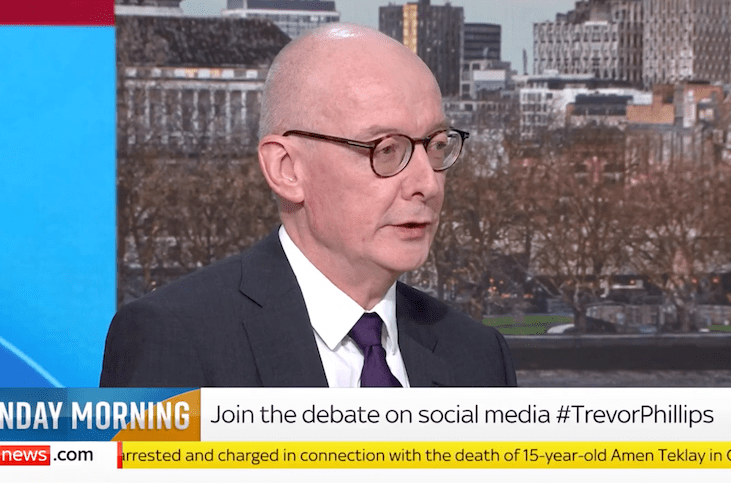Pat McFadden: ‘There’s a whole lot of change coming’ to the civil service
The government is set to announce big reforms at Whitehall which it hopes will save money and improve performance in a new ‘era of insecurity’. Among those changes are performance-related pay, a faster exit process for under-performing civil servants, and increased digitalisation with the use of AI.
On Sky News, senior cabinet minister Pat McFadden told Trevor Phillips that ‘the state has to reform’, but was coy when asked to specify how many civil servants might be cut. McFadden suggested that the headcount might be lower at Whitehall but higher in other areas of the country, and refused to confirm that the overall number would be lower by the end of this parliament. When pressed on how these changes would save money, McFadden referenced ‘the smart application of technology’ and claimed that what civil servants most want is ‘better performance management’.
Pat McFadden: ‘People are coming to terms with… the scale of change in European security’
This week, the US suspended intelligence sharing with Ukraine, in a move which dramatically weakens Kyiv’s ability to predict large incoming attacks. Following the move by Trump’s administration, Russia carried out massive missile and drone attacks across Ukraine. The UK and France have spearheaded a ‘coalition of the willing’ which could provide troops on the ground in Ukraine in the event of a ceasefire, but it is unclear yet how many countries will sign up to the initiative.
Speaking to Laura Kuenssberg on the BBC, Pat McFadden said it was important that Europe responds to the ‘pace and scale’ of the change to security that has happened in the last month. Kuenssberg asked McFadden if he was confident that 20 countries would sign up to the coalition. McFadden claimed that the success of the initiative couldn’t be measured by ‘adding up just the countries’, and said that the most important thing was a ‘secure and lasting peace’.
Richard Tice: ‘There was an unfortunate trend here’
Reform UK MP Rupert Lowe was suspended from the party this week over allegations of bullying by two female employees at Lowe’s office, and accusations that he had threatened party chairman Zia Yusuf with physical violence. (Lowe denies all the allegations, which he says are ‘untrue and false’.)
Speaking to Kuenssberg, deputy party leader Richard Tice described the situation as ‘very sad’, but said the party had had to act decisively. Kuenssberg pointed out that the timing of Lowe’s dismissal was ‘curious’, coming immediately after he had described Reform as ‘still a protest party’, whose leader, Nigel Farage, acts like a ‘messiah’. Tice suggested that Lowe’s behaviour had been a problem for some time, and that Reform had a duty of care to deal with allegations of inappropriate behaviour ‘in the responsible way’.
Chris Philp: ‘Parliament has been circumvented… by the way these ECHR rights are being interpreted’
The Conservatives have outlined a policy to stop immigrants challenging their deportation on human rights grounds in the UK courts. While they have not decided whether they think the UK should leave the European Convention on Human Rights, Shadow Home Secretary Chris Philp claimed that judges have been interpreting the ECHR in ‘very expansive ways’ which prevent deportations and circumvent UK laws around immigration.
Laura Kuenssberg referenced Lady Chief Justice Sue Carr, who said criticisms of judges decisions were ‘unacceptable, and conflicted with the duty of politicians to uphold the rule of law, and respect the independence of judges’. Philp said Carr was ‘wrong’, claiming that judges were ‘essentially inventing new law, without reference to parliament’. Commenting on the Tories’ plans, Pat McFadden argued they would result in an ‘outsourcing’ of immigration decisions to the Strasbourg court.
Latvian President Edgars Rinkevics: other European nations should introduce conscription
The threat to European security outside of Ukraine is most keenly felt in the Baltic countries which neighbour Russia. On Sky News, Trevor Phillips spoke to Latvian President Edgars Rinkevics, who outlined Latvia’s new conscription policy for men. Latvia is spending 4 per cent of GDP on defence, with more potentially to come, and they are also discussing conscription for women. Trevor Phillips asked whether other European countries should be following Latvia’s decisions on defence, and Rinkevics said, ‘seeing what is happening in the world… many other European countries’ should consider conscription.






Comments